Have you noticed YKK zippers on your clothes? Here’s everything you need to know about the zipper company that dominates the industry.
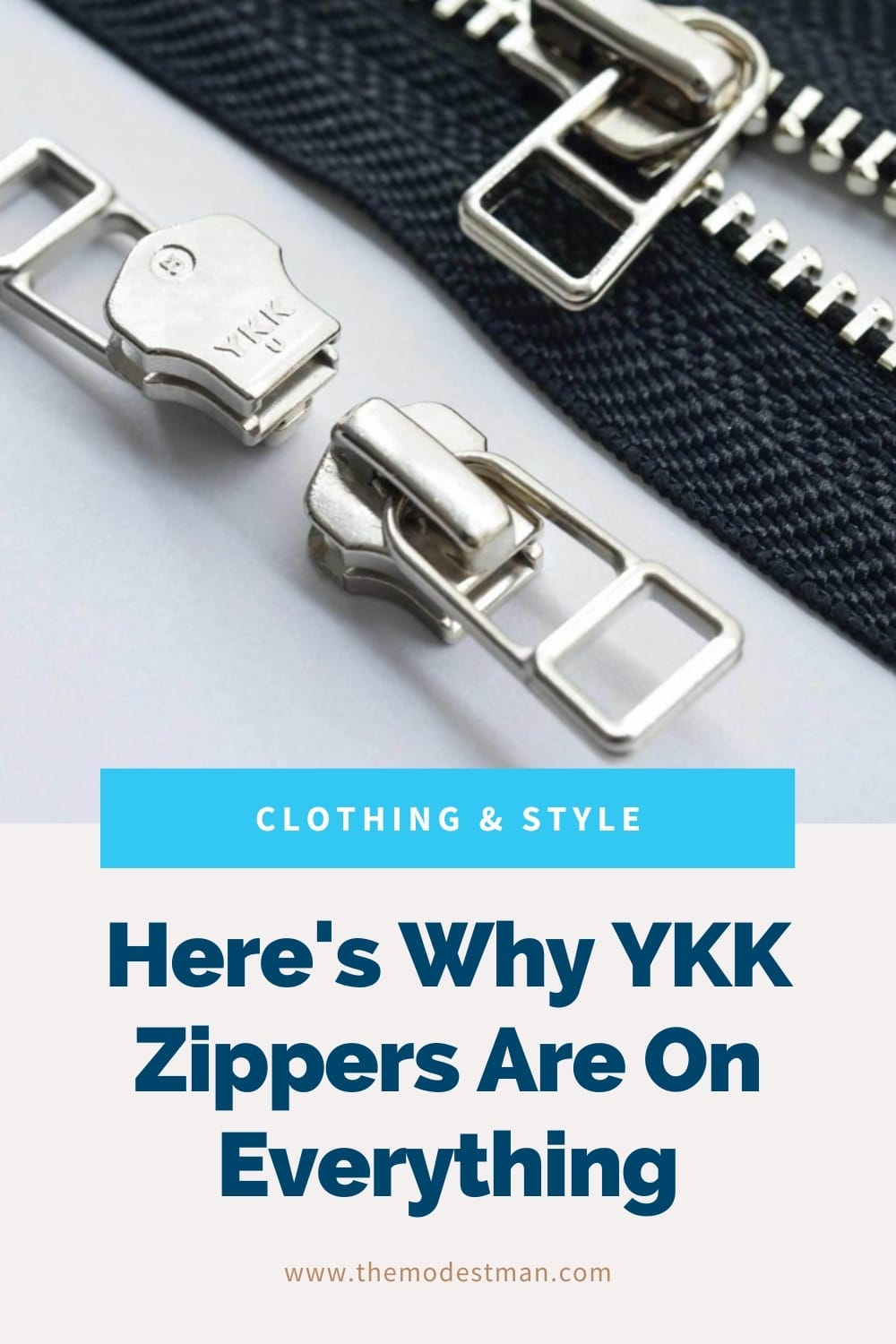
Take a look at your clothes. You might notice that 50% of the zippers say YKK. That’s a pretty amazing fact. One manufacturer makes almost half of all the zippers sold in the world – 7 billion a year!
Put another way, they manufacture 3 million kilometers of zipper a year, enough to circle the globe 80 times 🤯
What makes them so dominant in a field that doesn’t seem particularly technical or complex?
The answer is their dependability, their quality, and their innovation. Besides, there is a lot more to a zipper than you might think, and YKK does it as better than most, and as good as the best – every time.
History of YKK Zippers
YKK was founded in 1934 by Tadao Yoshida, a 24 year old worker in a fastener company. When his employer went out of business, he started his own company named San-S Shokai in Tokyo. It was renamed Yoshida Kogyosho Kabushikikaiska in 1938.
This roughly translates to Yoshida Company Limited. This was shorted to YKK – the same logo you’ll see if you look at your coat or jeans zipper right now.
Yoshida based every facet of his business on a philosophy that has become known as the “Cycle of Goodness”. This embodies the concept of mutual prosperity by stating that “no one prospers without rendering benefit to others”.
Every enterprise is “an important member of society, and as such it must coexist with other elements of society.
Its value will be measured by the benefits it shares with society…These contributions to society can best be achieved by the continual creation of value through innovative ideas and inventions.
The resulting business expansion will bring prosperity to consumers and business partners, thus benefiting all society.”
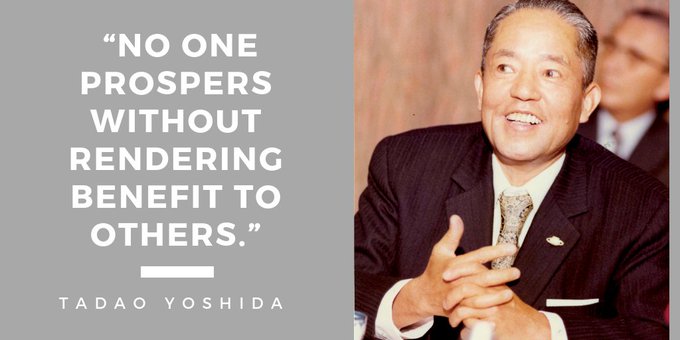
While many companies have lofty corporate philosophies, YKK lives theirs by ensuring that their workers, and their suppliers’ workers are treated fairly. This is an example of doing good paying off.
YKK has succeeded beyond comprehension to become the largest fastener company in the world supplying zippers, hook and loop tape, and snap and buttons that are used in apparel, the automotive industry, personal protective gear, tactical equipment, luggage, and even NASA.
They also have a division, YKK AP, that is one of the largest makers of architectural products such as windows, curtain wall systems, doors, and storefronts.
This may seem incongruous, but much of their success is due to YKK’s perpetual innovation, attention to every detail, and vertical integration which guarantees consistent quality.
YKK Is Vertically Integrated
Looking at the zipper in your jeans you see the metal teeth and slides and some fabric. Easy, right? It’s only a couple pieces. Actually, there’s much more involved.
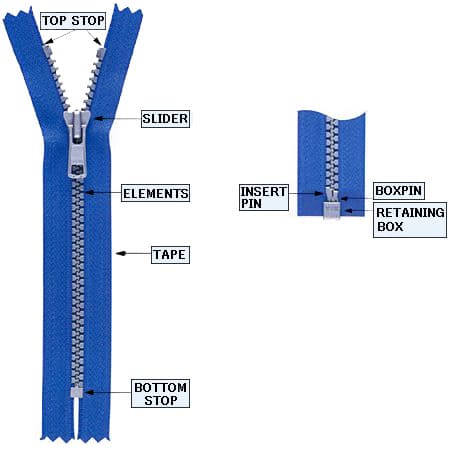
YKK starts with the raw materials such as brass or cotton, imagining the end product’s use, then they engineer, and build the machinery needed to turn these materials into the components of the zipper, build the zipper, then manufacture the boxes that the zippers are shipped in.
Finally, they work with their customers to help them use their product by building the machinery that enables them to economically and efficiently put YKK zippers/fasteners into the finished product.
Yes, they do lease these machines, but ultimately they save the user time and money by making it easier for them to manufacture products.
All of this is obviously a complex endeavor that takes space, ingenuity, many different specialties, as well as a commitment to detail. Today, YKK employs 42,000 people in 11 affiliated groups in 70 countries and regions around the world.
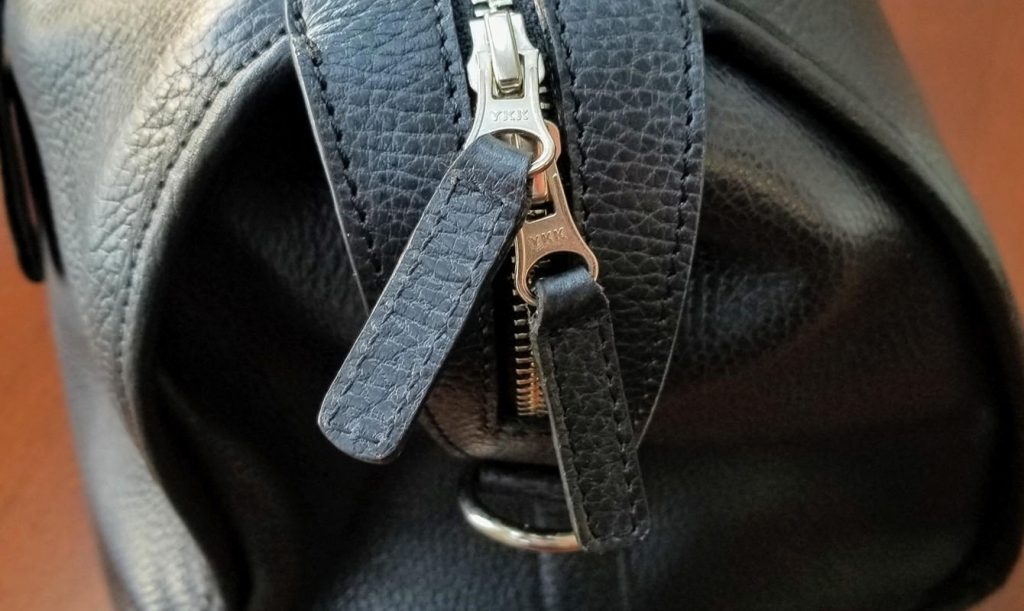
They have five different worldwide Research & Development centers that each specialize in a specific aspect of the business:
- Japan for core technology
- Italy supports the fashion industry
- Indonesia concentrates on raw materials research and price conscious markets
- The US and Taiwan develop high functioning fasteners for the automotive, aerospace, military, and medical industries
In 1974 YKK opened the North American facility in the softwood forests of Ocmulgee Park, in Macon, Georgia. They started with 54 acres and have grown to over 300 acres that houses 12 separate plants that work around the clock and through the weekend.
They also have another North American complex in Orange County, California, as well as other manufacturing plants around the US.
Making Zippers from Scratch
YKK makes all their products starting with raw materials. For instance, they produce the brass that goes into zipper top and bottom stops, sliders, pull tabs, and teeth at their Macon facility.
They start with pure copper and zinc which are smelted together in a huge furnace then cast into a narrow ribbon of molten brass. This goes through a hot rolling machine that, through intense heat and pressure, results in a superior strength brass that is 99.98% pure.
What isn’t used for zippers is shipped to their Lawrenceburg, Kentucky facility to be made into snap and button products.
While 45% of the production is brass zippers, half of which are used in jeans, 10% of their production is aluminum zippers that are good for corrosion-free products, and 45% are plastic/polyester coil, nylon molded-tooth zippers, and rail zippers.
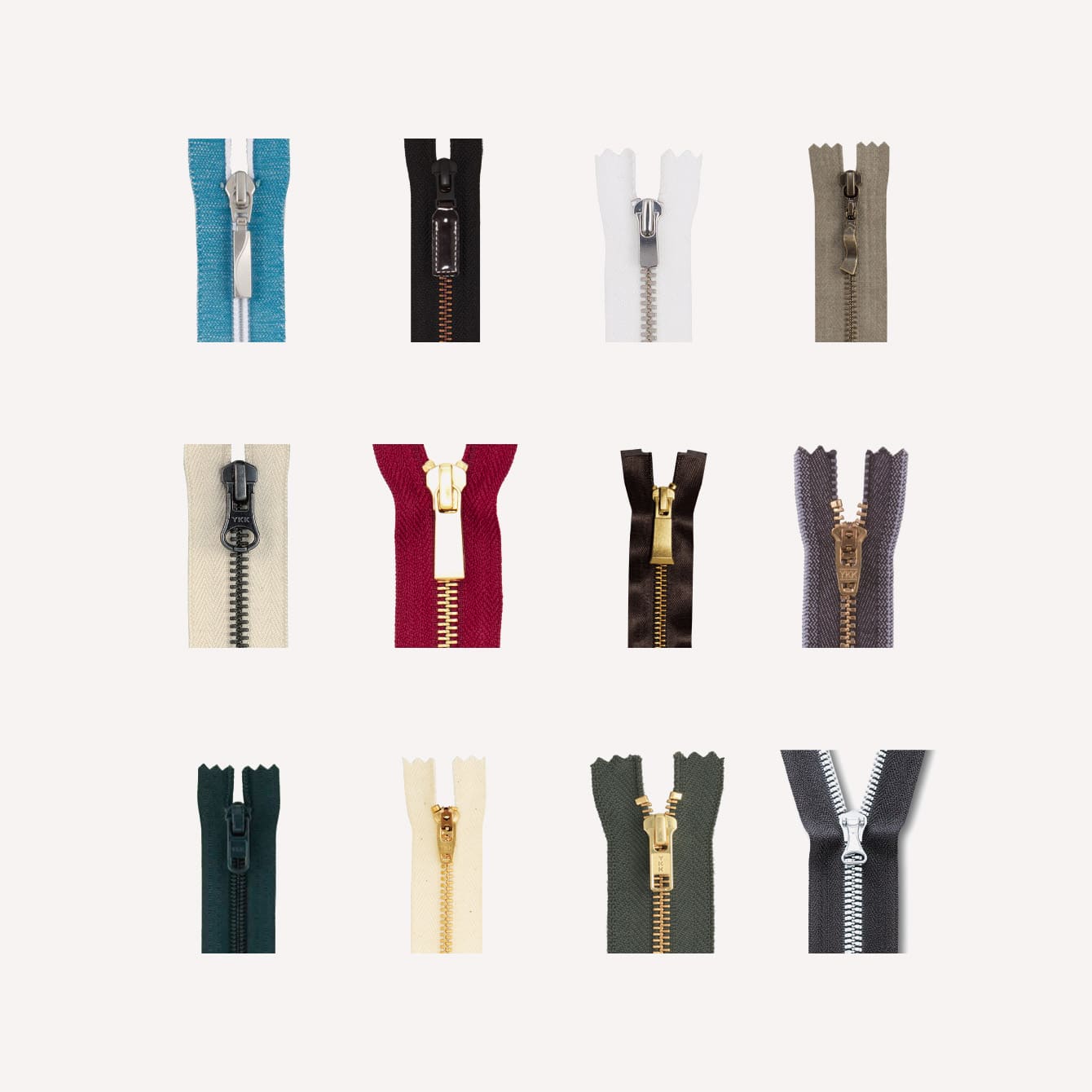
Metal zippers come in different widths, some curve and others are meant to be kept straight. Zippers can either be meant to separate completely like you would find on a coat, or have an end stop like you find on jeans.
For things like luggage or backpacks they have zippers that have a double pull. Some items, like reversible clothing, need zippers that are 2 sided, with pulls on the front and back of the zipper.
Zipper Tape
The tape part of YKK zippers can be solid, patterned (striped or checkered), made of organic cotton, Tencel™, recycled polyester, grosgrain tape, neon, or designed to be invisible.
Pull Tabs
Pull tabs can be either locking or not and come in finishes like glow-in-the-dark, enamel coated, pearl-like enamel, crackle finish, or standard finishes. They even produce sliders that reduce electrical shocks.
There are endless possibilities and YKK makes them all – over 1500 product styles in 427 standard colors.
Plastic and Metal Zippers
With the advent of non-metal zippers a whole new world opened up. Vislon® zippers have plastic teeth that are injected onto the tape which can blend into the fabric or even be invisible.
For their coil zippers, instead of forging the metal, YKK extrudes monofilament and weaves and dyes their own thread. Many of the Ziplon® zippers are more flexible and can go around curves. While plastic zippers can’t be repaired if a tooth breaks, they are resistant to dirt, corrosion, and UV rays.
If you need the flexibility of a coil zipper but crave the metallic look of metal, YKK created their Metallion® plastic line that comes in 11 metallic finishes.
Zipper Innovation
YKK has continued to innovate. They have started making zippers that are treated with Polygiene’s ViralOff® to fight viruses.
They have also created a magnetic zipper that facilitates quick clothing changes and makes it easier for children and people with disabilities to zip their clothes.
The right and left sizes merely have to be brought together and the two sides will engage.
YKK Sustainability
YKK has become an innovator in sustainability when it comes to their coil zippers. There are several very eco-friendly lines to choose from.
GreenRise® uses a plant-based material whose raw component is molasses, a byproduct in the manufacturing of sugar. This helps reduce CO2 emissions.
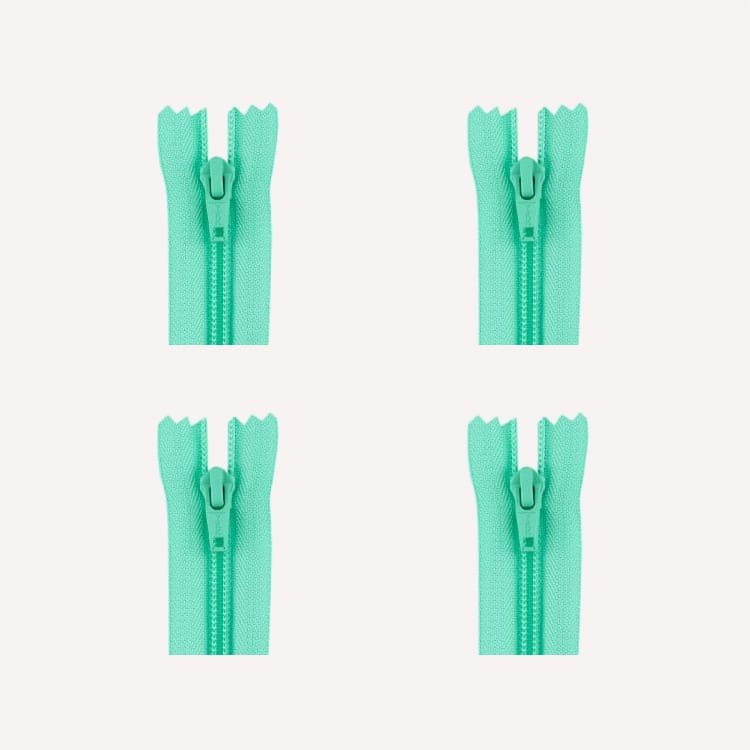
There are two versions of their Natulon® line which are made from post-consumer polyester. One is chemically recycled, while the other is mechanically recycled. Both are infinitely recyclable.
They use recycled water bottles (rPET), old fibers and other polyester remnants as their base material. 3,609 rescued water bottles will produce 10,000 zippers.
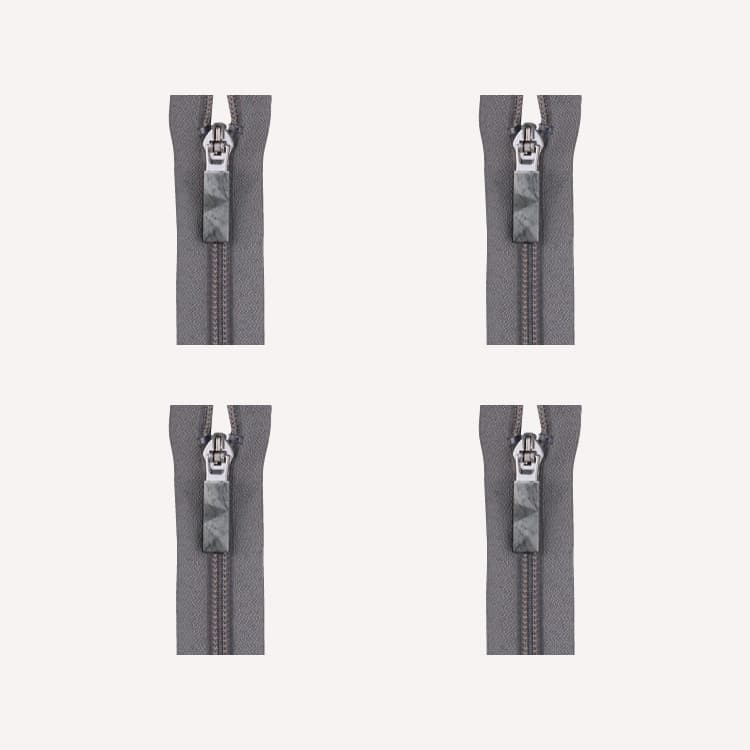
Natulon® also comes in an Ocean Sourced® version. Plastics that once would have been found in the ocean, waterways, and waste streams within 50 kilometers of coastlines is collected and recycled.
YKK Soflex 2.0®
For those instances where flexibility is imperative, YKK makes a couple of options.
Their Soflex® 2.0 stretches along with the fabric by as much as 5% so it’s perfect for curves, sportswear and compression wear.
They also make exceptional waterproof zippers.
YKK Aquaseal®
Their Aquaseal® line is used for marine sportswear because it’s flexible and has a film-coated tape and a zipper element that keeps water out.
There are 4 additional lines that are specifically for waterproof applications.
YKK Eco-Dye®
In addition to recycling plastics, YKK has created an Eco-Dye® waterless dying technique.
Their colors are just as bright and permanent as traditional dying techniques but because they use supercritical fluid dying technology they drastically reducing the amount of water needed to almost zero.
This means that not only is water saved, but no pollution is released into waterways. They have OEKO-TEX Standard 100 certification which means that there are no hazardous chemicals used in their manufacturing processes. They also meet the Zero Discharge of Hazardous Chemicals (ZDHC) standards.
Up until now we’ve explored YKK’s zippers, but they are also eco-friendly when it comes to their snap fastener buttons (the snap/button closure on your jeans).
Normally an electrical plating process would be used, but YKK uses the base color of the material itself, without electrical plating, in their finished products.
No heavy metals are used, and they save an enormous amount of electricity. This obviously hasn’t reduced the number of colors (80) available, just the amount of pollution created and energy used.
YKK Corporate Responsibility
As a good corporate citizen, YKK takes their responsibilities toward society and their fair business practices seriously. They support diversity in local communities and ask their suppliers to engage in fair business practices.
For YKK, “Fairness means cultivating the knowledge and wisdom within our company to make just decisions in every community around the world where we do business.”
In a global context, they pay fair wages, protect the environment and work with suppliers who do the same. They refuse to use conflict minerals (3TG tin, tungsten, tantalus, gold) that is mined in the Democratic Republic of Congo or adjoining countries.
They also seek to help their corporate customers use their products more efficiently. This is why they will design machinery that will meet specific needs and allow them to use YKK products in a cost- effective way.
While YKK products may cost a penny or two more per zipper, customers know that they are getting a quality product that meets YKK’s high standards to make each item as close to perfect as they can get.
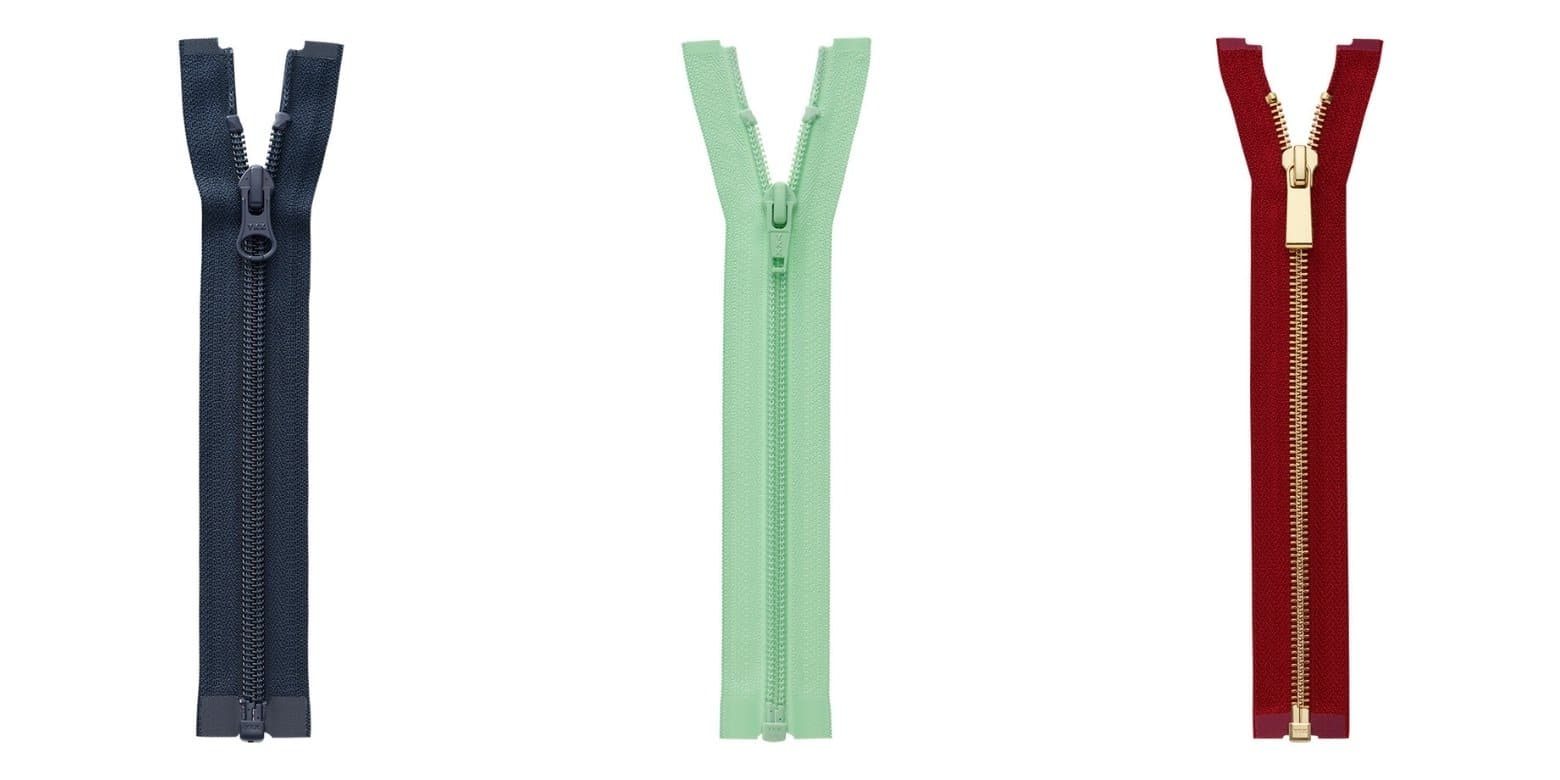
In 1994, Tadahiro Yoshia stated that “It is recognized today as being a most important duty for all humankind that we preserve the abundantly endowed global environment and that we transfer it to the next generation in a sound condition.”
The YKK Group proclaims that it will address and promote harmony with the environment as the highest priority of its business activities.
Through the years YKK has been granted a number of ethical and sustainable certifications such as OEKO-TEX, BlueSign, and several ISO Certifications.
This is really just a shorthand way of reassurance that they are distributing a sustainable product and they have ethical business practices.
Closing Thoughts About YKK
So, the next time you look down and see the YKK stamped on your fastener or zipper you’ll know that you are wearing a reliable, quality, well-designed product that was made by a company that values its workers, its customers, the environment, and you.
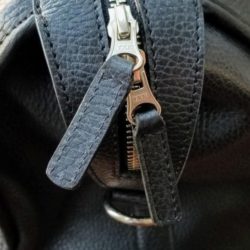





You’ll be able to read about Talon in another Modest Man article. They are still around (you can often find their zippers in fabric stores) and are actually one of the oldest zipper companies. They just went through a few name changes before becoming Talon.
Interesting article! I remember another zipper company called Talon (great name!), which seems to have all but disappeared from the market.